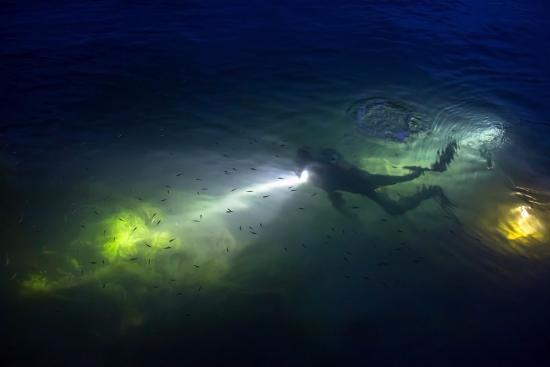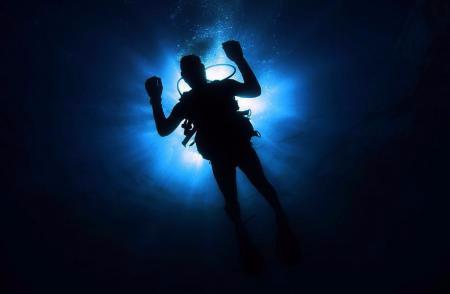 Not everybody likes night diving. It’s very different from diving in daylight, and some divers may feel claustrophobic, or others may have already started drinking alcohol before sunset. However, there are many scuba divers who really enjoy night diving, especially at coral reefs in Thailand. Here the water and air are both warm enough for night divers to be able focus on and enjoy the marine life and not have to think about being cold. Most of our Similan liveaboard safaris offer up to four dives every day and it would make sense that the final dive on most days is at night. But not all of them do, and those that do limit the night dives per trip for good reason. It’s also a common myth that OW divers aren’t certified to take part in night dives. This article is about night diving at Similan Islands. Which trips and who can join them.
Not everybody likes night diving. It’s very different from diving in daylight, and some divers may feel claustrophobic, or others may have already started drinking alcohol before sunset. However, there are many scuba divers who really enjoy night diving, especially at coral reefs in Thailand. Here the water and air are both warm enough for night divers to be able focus on and enjoy the marine life and not have to think about being cold. Most of our Similan liveaboard safaris offer up to four dives every day and it would make sense that the final dive on most days is at night. But not all of them do, and those that do limit the night dives per trip for good reason. It’s also a common myth that OW divers aren’t certified to take part in night dives. This article is about night diving at Similan Islands. Which trips and who can join them.
What is night diving?
This may seem like a daft question and an obvious answer. Night diving is scuba diving after dark. Normally, the maximum depth is not as deep as a day dive, and the length of the dive is also usually limited. The reasons for these are practical logistics, comfort and safety. There is no need to risk or push any limits by going deeper than 15-20 metres at night, and most divers will have already done up to three dives that day, meaning going deep is not good for the build-up of gases in the body. They tend to be limited to 30 or 45 minutes as this enables everyone to get back on board for dinner and some drinks, as well as give the dive staff opportunity to prepare for the following day.
What makes night diving special?
The marine life and whole feeling of a night dive is very different from diving in daylight. There are creatures such as lobsters, crabs and Moray Eels which are more active at night. Also, several shark species, such as WhiteTip Reef Sharks (Triaeondon obesus) hunt at night. In addition to this, the reef fish which are active during the day (diurnal) don’t disappear at night. They have to hide to rest. It is interesting to see Parrot Fish in their mucus bubbles and other species trying to stay safe inside coral formations. Also, there is bioluminescent plankton on most night dives. To properly enjoy this phenomenon divers should turn off or cover their flashlights/torches/lamps and wave arms or fins to stimulate the bioluminescence. And of course even without the marine life, diving in the dark provides a completely different feeling and atmosphere to day diving. It really is worth the effort and worth delaying the first beer of the day in order to get wet from 6.30pm for up to 45 minutes.
Which trips have night dives?
Almost all of our scheduled liveaboards offer at least one night dive per trip. Most diving guests would like to do a night dive, and it enables the cruise leader to stretch the day’s itinerary in order to fit in a beach visit and four dives.
Which dive sites are not suitable for night dives?
Night diving should only be done in a sheltered bay that is not too deep and very unlikely to have current.
 There are a few dive sites on our cruise itineraries where night diving is not done. This is mostly for safety reasons, but also because so much more can be seen and enjoyed during a sunset dive. Richelieu Rock is a submerged pinnacle in deep water far from the mainland or any islands. Due to its shape and location, currents are quite common at Richelieu Rock. For safety reasons, it’s not a good idea to dive there at night because if anyone becomes separated from the group, search and rescue would be extremely challenging. Also, Richelieu Rock is Thailand’s best dive site, with countless marine life individuals and lots of wonderful colours. A sunset dive is much more enjoyable as well as being safer. Koh Tachai is also not suitable for night diving, mainly for the same reasons as Richelieu Rock. Although Koh Tachai’s dive site is just a few hundred metres from the island, the currents here are both strong and unpredictable. Again, there is lots of life and colour to enjoy during a daylight or sunset dive. Finally, Koh Bon is less challenging and slightly less colourful than Richelieu Rock and Koh Tachai, but the island has no beach (just in case separated divers have to swim to land). Also, it is quite remote and currents can be an issue. In summary, night diving needs to be done safely in a protected shallow bay that won’t throw up unwelcome surprises. These three locations don’t have shallow bays protected from the wind and any currents.
There are a few dive sites on our cruise itineraries where night diving is not done. This is mostly for safety reasons, but also because so much more can be seen and enjoyed during a sunset dive. Richelieu Rock is a submerged pinnacle in deep water far from the mainland or any islands. Due to its shape and location, currents are quite common at Richelieu Rock. For safety reasons, it’s not a good idea to dive there at night because if anyone becomes separated from the group, search and rescue would be extremely challenging. Also, Richelieu Rock is Thailand’s best dive site, with countless marine life individuals and lots of wonderful colours. A sunset dive is much more enjoyable as well as being safer. Koh Tachai is also not suitable for night diving, mainly for the same reasons as Richelieu Rock. Although Koh Tachai’s dive site is just a few hundred metres from the island, the currents here are both strong and unpredictable. Again, there is lots of life and colour to enjoy during a daylight or sunset dive. Finally, Koh Bon is less challenging and slightly less colourful than Richelieu Rock and Koh Tachai, but the island has no beach (just in case separated divers have to swim to land). Also, it is quite remote and currents can be an issue. In summary, night diving needs to be done safely in a protected shallow bay that won’t throw up unwelcome surprises. These three locations don’t have shallow bays protected from the wind and any currents.
Which trips don’t do night dives, and why?
Our ‘flexible liveaboards’ usually offer a sunset dive as the final dive of each day instead of a night dive. The reasons for this are varied, but they usually include logistics and guests’ needs. Our flexible liveaboards run weekly schedules and each day of the week is at a different dive site. When customers ask questions, it’s not practically easy to explain clearly why there are night dives on some days and not on others. Also, the staff are constantly changing, meaning that another variable for them would for sure add confusion and possible mistakes. The flexible trips have set times for dives each and every day. It’s a lot easier to stick to that schedule than to vary it from one day of the week to the next. Finally, most guests join our flexible trips for 2 days and 1 night or 3 days and 2 nights. They normally want to spend as much time as possible underwater, looking at the colourful corals and fish. And many of these divers are less experienced which is why they choose a shorter trip. Less experienced divers may have never dived at night before and may not want to learn on a short cruise far out at sea, so this is another reason why the flexible boats tend not to offer night diving at The Similan Islands.
Who can and who can’t join night dives?
There is a commonly-believed myth that you need to be certified to Advanced level to dive at night. This is not true. The Advanced level dive courses normally include a night dive, but not always. The mandatory dives of an Advanced course are Deep and Navigation, not night diving. Ok, in practical terms, most divers who are experienced and confident enough to dive at night will have progressed to the Advanced level and probably logged at least 20 dives in their lives. But this doesn’t mean that a confident Open Water diver can’t join a night dive. They can. Practically though, if you have fewer than 10 logged dives and you’re Open Water certified, it’s usually a good idea to get more day-diving experience before you jump in at night. Divers younger than 12 or 15 years old may also need special supervision for night diving.
The content of this page is based on our extensive experience of scuba diving at The Similan Islands while working in conjunction with our dive centre partners and getting feedback from our thousands of diving guests. The text is just a guide of what to expect about night diving on your Similan Islands liveaboard trip. Some trips which normally offer night dives might not have one on the trip that you join. Likewise, trips which don’t normally offer a night dive might occasionally do so. The cruise leader on each trip makes the final decision on the itinerary and who is able to join each dive. Sometimes, divers who may show a lack of buoyancy skills during a day dive may not be permitted to dive at night even if they are certified to Advanced level.


